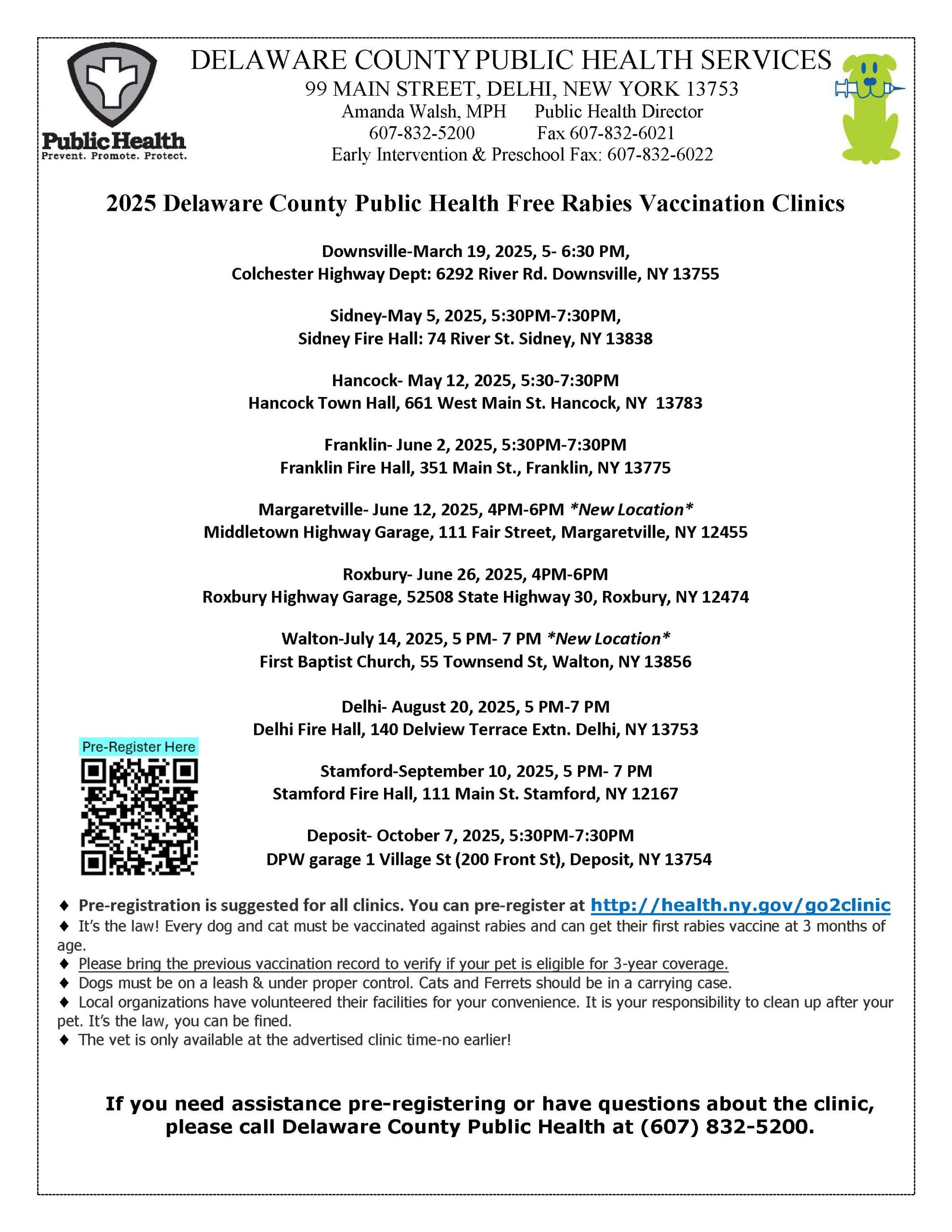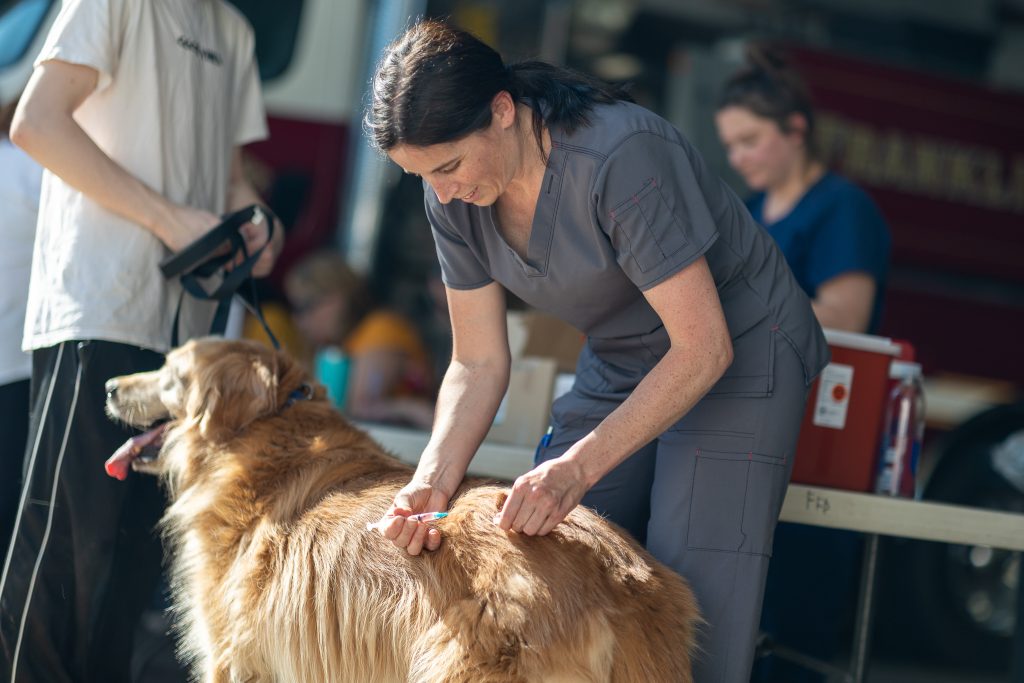Rabies
Rabies is a preventative viral infection of mammals, usually transmitted by an infected animal’s bite.
Rabies is prevalent throughout North America and is diagnosed every year in Delaware County.
Report all animal bites to Delaware County Public Health at 607-832-5200.
2025 Delaware County Public Health Free Rabies Vaccination Clinics


2025 Free Rabies Vaccination Clinics
- Downsville-March 19, 2025
5:00PM-6:30PM
Colchester Highway Dept
6292 River Rd., Downsville, NY 13755 - Sidney-May 5, 2025
5:30PM-7:30PM
Sidney Fire Hall
74 River St., Sidney, NY 13838 - Hancock-May 12, 2025
5:30PM-7:30PM
Hancock Town Hall
661 West Main St, Hancock, NY 13783 - Franklin-June 2, 2025
5:30PM-7:30PM
Franklin Fire Hall
351 Main St, Franklin, NY 13775 - Margaretville-June 12, 2025 *New Location*
4:00PM-6:00PM
Margaretville Highway Garage
111 Fair Street, Margaretville, NY 12455 - Roxbury-June 26, 2025
4:00PM-6:00PM
Roxbury Highway Garage
52508 State Highway 30, Roxbury, NY 12474 - Walton-July 14, 2025 *New Location*
5:00PM-7:00PM
First Baptist Church
55 Townsend St., Walton, NY 13856 - Delhi-August 20, 2025
5:00PM-7:00PM
Delhi Fire Hall
140 Delview Terrace Extn, Delhi, NY 13753 - Stamford-September 10, 2025
5:00PM-7:00PM
Stamford Fire Hall
111 Main St., Stamford, NY 12167 - Deposit-October 7, 2025
5:30PM-7:30PM
DPW Garage
1 Village St (200 Front St), Deposit, NY 13754
FAQ:
– What is rabies?
Rabies is a preventable viral disease most often transmitted through the bite of a rabid animal. The rabies virus infects the central nervous system of mammals, ultimately causing disease of the brain and death. Rabies is most often seen among wild animals such as raccoons, bats, skunks, and foxes, but any mammal can be infected with rabies. Pets and livestock can get rabies if they are not vaccinated to protect them against infection.
What are signs that an animal has rabies?
The first sign of rabies is usually a change in an animal’s behavior. It may become unusually aggressive or tame. The animal may lose its fear of people and natural enemies. A wild animal may appear affectionate and friendly. It may become excited or irritable and attack anything in its path. Staggering, convulsions, choking, frothing at the mouth and paralysis are sometimes seen. Many animals will make very unusual sounds. Infected animals usually die within one week after showing signs of rabies.
What should I do if I was exposed to an animal that might be rabid?
1. Wash the wound immediately with soap and water.
2. Report the animal bite to Delaware County Public Health Services 607-832-5200 or 607-832-5555 after 4pm, weekends and holidays. Staff is available around the clock to respond to rabies questions and potential exposures. Call your doctor or go to the nearest emergency room; you may need a rabies vaccination.
How do I protect my pets from rabies?
The best way to keep pets safe from rabies is to vaccinate them and keep their shots up-to-date. If your pet has been injured by a rabid animal, contact your veterinarian to get medical care. Even though your pet has been vaccinated, a booster dose of rabies vaccine may be needed within five days of the incident. Contact Delaware County Public Health Services to determine if more follow up is needed.
A bat was flying around in my child’s bedroom while the child was sleeping. What should I do?
If you or someone in your home has potentially been exposed to a bat, the bat should be safely captured (if possible) and you should immediately contact Delaware County Public Health Services. When appropriate, Public Health will arrange for testing of the bat. If the bat can be captured and tests negative for rabies, then you will not need PEP.
Protect you, your family and your pets from rabies:
- Avoid all contact with unfamiliar animals.
- Keep vaccinations up to date for all pets.
- Never handle or adopt wild animals, or bring them into your home.
- Prevent bats from entering your home.
- Do not let your pets run free or leave them unattended.
- Keep pets indoors at night.
- Feed pets indoors, so outdoor food dishes won’t attract strange animals.
- Tightly cap garbage cans.
- Encourage children to immediately tell an adult if they are bitten by an animal.
- Report all animal bites to Delaware County Public Health Services.


Links are provided as a convenience and for informational purposes only; they do not constitute an endorsement or an approval by Delaware County of any of the products, services or opinions of the corporation or organization or individual. Delaware County bears no responsibility for the accuracy, legality or content of the external site or for that of subsequent links. Contact the external site for answers to questions regarding its content.


